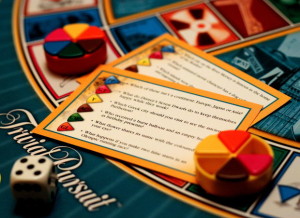Quite often I talk about family traditions in my blog. One that I don’t believe I covered yet is bocce.

Bocce is played with eight heavy balls (bocce) around the size of a softball and one smaller ball (jack) called the pallino which is about the size of a golf ball. It can be played one-on-one, or in teams of two, three, or four.

In our hometown (Vandergrift, Pennsylvania), the local Sons of Italy club had bocce courts on their property for years. The men would gather and play. For a while, leagues were formed, but that gave way to just friendly pick-ups. It was a chance for the men to get together and play a game from their heritage while enjoying the company of their friends. When we moved to Ohio, we joined the Sons of Italy there, and they had leagues that included women. We moved away before we got to participate, however, but the game was quite popular there. When we lived in Michigan, there was actually a restaurant with many indoor courts. They catered to league play, but when the leagues weren’t competing, anyone could take a court and play a game or two. We were happy to see that when we moved there; it was a way our family (our kids were little then) could all get together and do something fun.
My husband’s family takes bocce pretty seriously. My father-in-law travels with his own set of bocce balls, he wipes them clean between each toss, and he keeps a tape measure with his kit in case there is a discrepancy among players as to whose ball is closer. My husband loves the game so much, he built a court in our backyard. My kids also loved the game until they had to shovel tons of rock and gravel to complete our court. You would think they’d like to enjoy the fruits of their labors, but they only play if friends or grandparents visit. (They all get pretty competitive. I like a slightly more relaxed game.)
So why am I babbling on about bocce? Well, for three reasons.
One—no one who comes to my house knows what the court is for or what the game is, so I thought I’d offer an explanation to those of you who don’t know.
Two—it’s just another opportunity to share Italian traditions with you, so you understand more about me.
Three—there’s a lot that can be learned from the game, personally and professionally.

Personally, bocce (and any sport or game) teaches patience, hand-eye coordination, and hopefully good sportsmanship. It’s an easy enough game that young children can play (keeping them involved with family instead of alone playing their own games), intricate enough that adults can get competitive, and gentle enough that even the elderly or infirm can participate. It truly is an all-inclusive game, and if we had more activities like these, our physical and emotional health could only improve. It’s a lot better than four people in four different rooms of the house watching television or playing video games.
Professionally there are lessons to be learned, too. I’m a writer, and I’ve learned a lot that I can apply to my craft from analyzing the game.
One—practice makes perfect. Just like the first ball you roll won’t be nearly as good as one you roll after one hundred games, the first draft of something you write won’t be nearly as good as something you’ve revised. Also, the first book you write won’t go nearly as smoothly as the tenth book you write. They say you need 10,000 hours to master a task; get writing! You can fake a lot until you make it, but you can’t fake experience.
Two—sometimes you have to change strategy. In bocce, you can roll until your wrists are sore, but if a ball is blocking you, you need to shoot it out of the way. In writing, sometimes even carefully crafted plots for some reason don’t work. When that happens, the best course of action is to abandon the plan and try to take things in a different direction. Listen to what your characters are telling you. They know best what they need to do, and if they aren’t following your plan, there’s probably something better for them to do.
Three—don’t get cocky. In bocce, just because the score is 10-2 doesn’t mean you have the game in the bag. Three good turns by the other team could have them in the lead. In writing, you can’t take anything for granted. You might have a solid story and a rock-star agent, but that doesn’t mean anything. Even once you get the contract and the advance, your work isn’t over. There’s marketing to do, and you have to keep producing or the ride is over.
Four—in bocce, whether winning or losing, be a good sport. You don’t want to be the person no one wants to play with because of your attitude. In the publishing industry, always be gracious, even to someone giving you a bad critique; you don’t know who your words will reach, and you never want to have a bad reputation.
So, bocce is a fun Italian game the whole family can enjoy. The next time you see people rolling colored balls down a beach or in their yard, you’ll know what they’re doing. Take the time to watch and learn, maybe even join in. You’ll have a blast. And don’t forget to take some lessons away from the game.
What games did your family play growing up? Did you learn anything from them? Why don’t you share in the comments?














